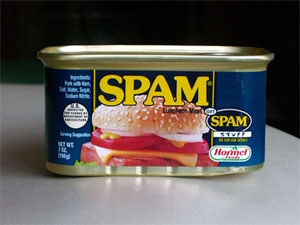I’ve had this blog online for only a few weeks now and the spammers have already started their attacks. I’ve gotten two genuine comments (ok, they’re from friends of mine, but they still count!) and I just got my second spam comment.
So people, if you’re reading this, remember to comment, or the spammers win…. ![]()
The spammers are getting sneakier, though. The comments aren’t all about black market Viagra, or hordes of russian girls “just waiting for you”. No, the comments I’ve gotten are parts of Search Engine Optimization (SEO) schemes. The aim of SEO is to get your website to appear at the top of search results, for instance on Google. One major factor in SEO is links from other sites. So, by commenting on random blogs and including a link for the website to be given the SEO treatment, you hope to drive traffic to the website both directly, by the included link, and indirectly, by getting higher up on Google because you have a lot of foreign links pointing to your site.
Here are the spam comments I’ve had so far:
Son Terry:
You are a good writer… I am just learning english maybe you could proof read my article for me so I can be good as you.
And:
Cory Everson Today:
I do trust all of the ideas you’ve introduced for your post. They’re very convincing and can definitely work. Still, the posts are very quick for novices. Could you please lengthen them a bit from subsequent time? Thanks for the post.
To the untrained eye, these comments may look pretty innocent, but I’m getting fairly savvy at recognizing crap. ![]() So how do you identify these as bogus?
So how do you identify these as bogus?
First of all, look at the relevance of the comments to the actual post. The first comment was posted below one of my Album of the Week posts. Now I actually enjoy proof reading, and I’m pretty damn good at it, so I jumped a bit when I read the comment. It didn’t really make much sense in that context, though, so it looked suspicious. The second step, then, was to hover the mouse pointer over the commenter’s name, to see what website he was linking to. This revealed an address with the word “pay” in it, and it didn’t look right to me. The third, and most revealing test was to copy a sentence from the comment and google it.
In this case, a search for the phrase “I am just learning english maybe you could proof read” yielded over 6000 results. Looking at some of them, it was immediately obvious that the same comment had been posted all over the web. The top search result even said “Powered by SEO Super Comments”. Real subtle….
The other commenter had linked to a bodybuilding forum, not really the crowd I’m aiming this blog at, to be honest. A quick search for the phrase ”I do trust all of the ideas you’ve introduced for your post.” gave me over 300,000 results! Glancing at the top ones, it was once again obvious that they were all variants of the same comment.
So, I’ve removed the comments, and I urge you to do the same if you have your own website. Identifying and removing spam will help you keep your comment fields relevant, will help your readers avoid clicking on crap links, and will also hinder the companies paying for and performing this kind of SEO services that fills the web up with more unnecessary crud.
Also, please, please, please don’t hire people offering these SEO services. There are better, more honest ways to SEO your website.
I’ll be back later tonight with a new sunday comic.
Stay safe.
Photo by Janet Galore (http://www.flickr.com/photos/janetgalore/)
Used under CC-BY-SA license.

